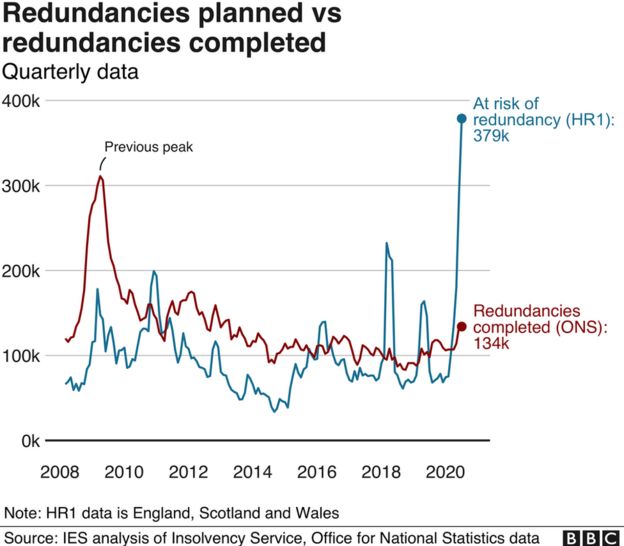
Jobs 'crisis' twice as bad as previous recession
About 180,000 job cuts were planned from January to March 2009, while 380,000 were planned from May to July this year.
Completed redundancies could reach 735,000 this autumn, researchers say.
The figures were obtained by an Institute for Employment Studies (IES) Freedom of Information request.
Social distancing measures to prevent the spread of Covid-19 brought large parts of the UK economy to a standstill, forcing workers to stay at home, closing shops and bringing transport to a halt.
As a result, many businesses have been forced to consider reducing their workforces by making employees redundant.
Employers in England, Scotland and Wales must notify the Insolvency Service if they plan to make 20 or more workers redundant in any single "establishment" using a form called HR1.
This information is not usually published, but on 8 September a Freedom of Information request by the BBC revealed that employers had listed more than 380,000 positions as at risk between May and July 2020.

The IES has now obtained and analysed data stretching back as far as 2008.
This shows that the current redundancy wave is more than double the previous three-monthly peak of 180,000 from January to March 2009.
Then the crisis, which had begun in the finance industry, was affecting most of the economy - and forcing many employers to reduce their staff.
"Comparing what is happening now with what was happening in the last recession shows us we are experiencing a jobs crisis unlike anything we have seen before," said Tony Wilson, Director of the IES.
The IES is calling for extra support for viable firms to help them retain staff, as well as training and advice to help those who lose their jobs find new employment rapidly.
A government spokesperson said: "Supporting jobs is an absolute priority which is why we've set out a comprehensive 'Plan for Jobs' to protect, create and support jobs across the UK by providing significant, targeted support where it is needed the most."
Government measures include the £2bn "kickstart scheme" to encourage employers to create new training placements and apprenticeships, extra work coaches in job centres, and a £1,000 incentive to encourage employers to bring staff back from furlough.
Will these planned redundancies be completed?
Because they are filed at the start of the redundancy process, HR1 forms give an early indication of what is happening in the labour market.
The HR1 redundancy figures don't pick up employers cutting fewer than 20 jobs, so the final total of redundancies is usually higher.
The Office for National Statistics also publishes a redundancy count based on the Labour Force Survey, which is used to calculate the monthly unemployment rate.
This is always published a few months after the data is gathered, so it hasn't yet picked up a big spike in redundancies or unemployment.

However, Labour Force Survey redundancy figures have been around 20% higher than HR1 figures in recent years.
On this basis, the IES estimates that 445,000 jobs could be made redundant between July and September, considerably worse than the three-month peak in the previous recession.
During that recession, however, actual redundancies were 80% higher than notified redundancies - which could lead to as many as 735,000 positions being cut at the height of the coronavirus crisis.
However, companies sometimes announce plans redundancies which they don't actually make, because circumstances change.
Early 2019, for example, saw a big spike in redundancy plans which were never completed. Mr Wilson believes they could have been linked to fears of a no-deal Brexit, which did not happen.
The 2018 spike could be linked to the collapse of the construction company Carillion, which had a lesser impact on jobs than initially feared.
Companies in Northern Ireland file HR1 forms with the Northern Ireland Statistics and Research Agency and they are not included in these figures.










